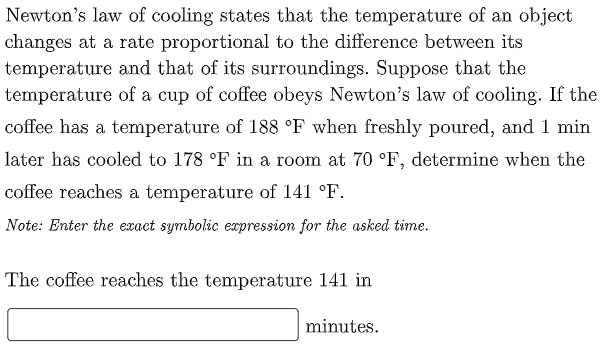Newton's law of cooling states that the temperature of an object changes at a rate proportional to the difference between its temperature and that of its surroundings. Suppose that the temperature of a cup of coffee obeys Newton's law of cooling. If the coffee has a temperature of 188 °F when freshly poured, and 1 min later has cooled to 178 °F in a room at 70 °F, determine when the coffee reaches a temperature of 141 °F. Note: Enter the exact symbolic expression for the asked time. The coffee reaches the temperature 141 in minutes.
Newton's law of cooling states that the temperature of an object changes at a rate proportional to the difference between its temperature and that of its surroundings. Suppose that the temperature of a cup of coffee obeys Newton's law of cooling. If the coffee has a temperature of 188 °F when freshly poured, and 1 min later has cooled to 178 °F in a room at 70 °F, determine when the coffee reaches a temperature of 141 °F. Note: Enter the exact symbolic expression for the asked time. The coffee reaches the temperature 141 in minutes.
Linear Algebra: A Modern Introduction
4th Edition
ISBN:9781285463247
Author:David Poole
Publisher:David Poole
Chapter6: Vector Spaces
Section6.7: Applications
Problem 13EQ
Related questions
Topic Video
Question
Please solve & show steps...

Transcribed Image Text:Newton's law of cooling states that the temperature of an object
changes at a rate proportional to the difference between its
temperature and that of its surroundings. Suppose that the
temperature of a cup of coffee obeys Newton's law of cooling. If the
coffee has a temperature of 188 °F when freshly poured, and 1 min
later has cooled to 178 °F in a room at 70 °F, determine when the
coffee reaches a temperature of 141 °F.
Note: Enter the exact symbolic expression for the asked time.
The coffee reaches the temperature 141 in
minutes.
Expert Solution
This question has been solved!
Explore an expertly crafted, step-by-step solution for a thorough understanding of key concepts.
This is a popular solution!
Trending now
This is a popular solution!
Step by step
Solved in 2 steps with 2 images

Knowledge Booster
Learn more about
Need a deep-dive on the concept behind this application? Look no further. Learn more about this topic, advanced-math and related others by exploring similar questions and additional content below.Recommended textbooks for you

Linear Algebra: A Modern Introduction
Algebra
ISBN:
9781285463247
Author:
David Poole
Publisher:
Cengage Learning

Algebra & Trigonometry with Analytic Geometry
Algebra
ISBN:
9781133382119
Author:
Swokowski
Publisher:
Cengage

Linear Algebra: A Modern Introduction
Algebra
ISBN:
9781285463247
Author:
David Poole
Publisher:
Cengage Learning

Algebra & Trigonometry with Analytic Geometry
Algebra
ISBN:
9781133382119
Author:
Swokowski
Publisher:
Cengage